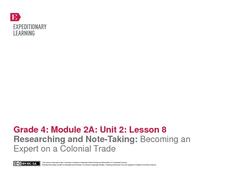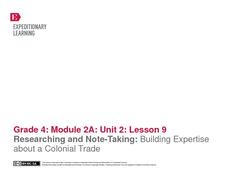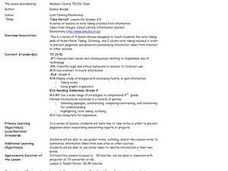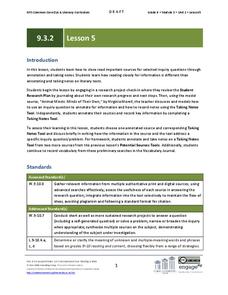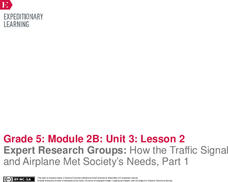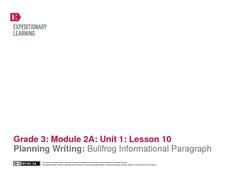EngageNY
Reading and Taking Notes on Colonial Trades
In the tenth instructional activity of this unit, young scholars learn to categorize information as they continue researching their colonial trade. During guided practice, the teacher models how to read informational text slowly while...
EngageNY
Researching and Note-Taking: Becoming an Expert on a Colonial Trade
Fourth graders work in small groups to become experts on different colonial trades in the eighth instructional activity of this unit. Working toward the long-term goal of writing a piece of historical fiction, young scholars read...
Curated OER
Note-Taking: K.I.S.S. "Keep It Short and Simple"
Note-taking is an essential study skill, and it needs to be taught! In the context of a research project on energy sources, learners find multiple sources, evaluating, paraphrasing, and citing them correctly. Two lists with note-taking...
EngageNY
Researching and Note-Taking: Building Expertise about a Colonial Trade
Building on the previous activity in this unit on colonial trade, the ninth activity has young experts continuing their research and writing summaries of the information they find. To begin, children participate in guided practice where...
EngageNY
Listening Closely and Taking Notes: Colonial Trade Podcast About the Wheelwright
Voices from the past. Young scholars listen to a podcast interview with a historical re-enactor as they continue their research in the eleventh instructional activity of this unit on colonial trade. Applying their close reading skills,...
EngageNY
Listening Closely and Taking Notes in Expert Groups: Colonial Trade Podcast
The twelfth instructional activity of this unit builds on the skills developed in the previous instructional activity, as fourth graders continue their quest to become experts on colonial trade by listening to interviews with historical...
Curated OER
Pizza Biography
A biography writing lesson with a tasty twist! Kids create a "visual biography" in which each pizza slice represents a paragraph, and toppings represent supporting details. They learn research techniques, note-taking skills, and how to...
Curated OER
Note Taking
Third graders get ready to take notes on a field trip. In this notetaking lesson, 3rd graders take notes to remember what they've seen on a field trip. Students draw and analyze diagrams of what they have seen. Students access their...
EngageNY
Mid-Unit Assessment: On-Demand Note-taking and Text-Dependent Questions
Flex those brain muscles! Scholars take a mid-unit assessment, conducting research to take notes about how a particular invention helped meet society's needs. To complete the test, they work on draft sketches for their graphic novelettes.
Curated OER
Take Note2!
Students practice the note-taking skills of Pocket Note Taking, Outlining, and 2 column note taking. They use pocket notes, outlining, and/or two-column notes to summarize information taken from web sites or other sources. Afterward,...
EngageNY
Researching about the Red Cross: What Is a Multinational Aid Organization?
Lend a helping hand. Pupils read two informational articles about international aid organizations and how they help areas affected by natural disasters. Scholars attempt to uncover the gist of each text, discussing their thoughts in...
Curated OER
Note-taking and Organizational Strategies
Students practice taking notes. In this written communication lesson plan, students discuss the purpose of taking notes and then research note-taking methods using the provided Web site tool. Students practice using one of the...
Curated OER
Be An Effective Note-Taker
Guide your middle schoolers through the process of taking notes with this presentation. With tips and suggestions in the first half, the slideshow could be a good way to begin a research unit in your classroom. The second half of the...
EngageNY
Grade 9 ELA Module 3, Unit 2, Lesson 5
Once you find and evaluate your sources, it's time to discern the most helpful information. In a research lesson plan based on questions derived from Temple Grandin's Animals in Translation, practice annotation and taking notes.
EngageNY
Close Reading of Bullfrog at Magnolia Circle: Main Ideas about the Bullfrog
As your class reaches the end of the book Bullfrog at Magnolia Circle, the seventh instructional activity in this literary unit helps third graders transition from reading narrative to expository writing. Scholars develop their...
EngageNY
Documenting Research: Sorting and Recording Information About the Wheelwright
Fourth graders practice using a graphic organizer to record their notes and answer text-dependent questions while supplying evidence of how they found their answer. They focus on a machine called the wheelright, which was commonly used...
EngageNY
Conducting Research: Analyzing a Variety of Sources to Capture Information about My Insect
From picture to words. Scholars analyze a picture of an ant and then list two facts they observed and any questions that may arise. Expert groups from the previous instructional activity then look at a diagram about either an ant or...
EngageNY
Researching about the Red Cross, Continued: How Did the Red Cross Aid Haiti After the 2010 Earthquake?
What a puzzle! Scholars participate in a Jigsaw discussion within their expert groups, determining the gist of an article about the 2010 Haiti earthquake. As they read and discuss the article, they record thoughts on their note catchers.
EngageNY
Expert Research Groups: How the Traffic Signal and Airplane Met Society’s Needs, Part 1
Where would society be without the TV? Working together, scholars complete an anchor chart about the invention of the television. Additionally, pupils complete vocabulary cards for key terms from the unit and organize them on a metal ring.
Curated OER
Take Your Time
Your class examines the ways that they spend time by evaluating their own schedules. They create a peer research survey to gather information about their various habits. They analyze the data and compare/contrast the activities of...
Curated OER
Comprehension: Compare and Contrast Topics in Two Texts
A scripted lesson can be a big help for new teachers. This fully scripted three-day learning activity provides teachers with the means to demonstrate how to compare and contrast two topics in two texts. Learners will work as a class to...
Curated OER
Note Taking: Research on the Middle Ages
Learners explore the Middle Ages. In this research skills instructional activity, students research selected Internet sources regarding the Middle Ages and use the provided graphic organizers to take notes regarding the information they...
EngageNY
Taking Notes and Citing Quotes from Text: Gathering Information on our Rainforest Insects
In other words. Scholars practice using paraphrasing and quotes. They partner in pairs to write a paraphrase for an information text strip. Individuals then use their skills to paraphrase information from the text Fire Ants.
EngageNY
Planning Writing: Bullfrog Information Paragraph
Lesson ten in this unit for the book Bullfrogs at Magnolia Circle, prepares third graders to begin writing an informational paragraph about the adaptations of bullfrogs. First, young writers work either independently or in pairs to...



